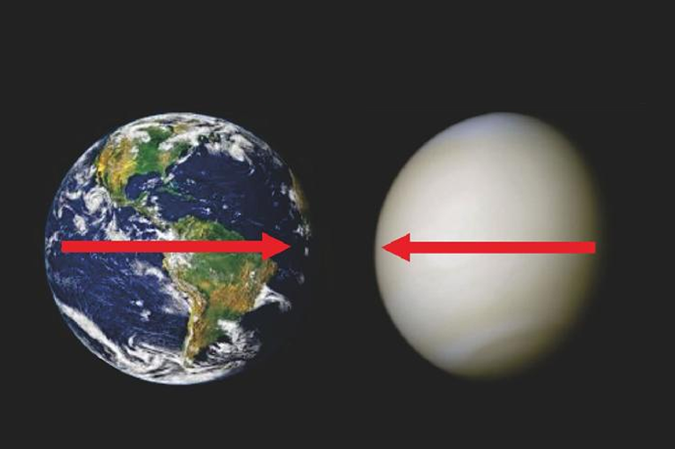Venus, often referred to as Earth’s “sister planet,” is a celestial body shrouded in mystery and intrigue. One of its most fascinating characteristics is its unique rotation: Venus spins backward compared to most other planets in our solar system. This retrograde rotation raises questions about the planet’s formation and the forces that have shaped its evolution over billions of years. This narrative explores the peculiarities of Venus’s rotation, the theories behind its backward spin, and the implications for our understanding of planetary dynamics.
The Odd Rotation of Venus
Unlike Earth and most planets, which rotate counterclockwise (from west to east), Venus rotates clockwise, causing the sun to rise in the west and set in the east. This retrograde rotation is not just a trivial detail; it has profound implications for how we understand planetary motion and evolution. A day on Venus, defined as one complete rotation on its axis, takes approximately 243 Earth days, which is longer than a Venusian year of about 224.7 Earth days. This means that a single day on Venus lasts longer than a year, creating an unusual day-night cycle.
Theories Behind Retrograde Rotation
Several theories have been proposed to explain why Venus spins backwards. One prominent hypothesis suggests that Venus may have experienced a significant collision with a large celestial body during its formative years. Such an impact could have altered its rotational direction, flipping it onto a clockwise path. This theory is supported by the notion that the solar system was once filled with high-speed objects like asteroids and comets, which could have collided with planets, causing dramatic changes in their rotation and orbit.
Another theory posits that the thick atmosphere of Venus plays a crucial role in its rotation. The planet’s atmosphere is composed mainly of carbon dioxide and is about 90 times denser than Earth’s atmosphere. As solar radiation heats this dense atmosphere, it creates strong tidal forces that could gradually slow down the planet’s rotation until it reverses direction. This gradual slowing might have been influenced by interactions with the Sun’s magnetic field or friction between different layers within Venus’s interior.
The Role of Atmospheric Dynamics
The dynamics of Venus’s atmosphere are not only responsible for its extreme greenhouse effect but also for its peculiar rotational behavior. The thick clouds surrounding Venus create a complex weather system that can influence surface conditions and atmospheric circulation patterns. These atmospheric tides could exert torque on the planet, potentially leading to changes in its rotational speed and direction over geological timescales.
Additionally, studies suggest that if Venus had an initial tilt during its formation, this could have contributed to its current retrograde spin. Some models indicate that if Venus initially rotated rapidly with a significant axial tilt, it might have been more susceptible to disruptions from external forces, such as collisions or atmospheric interactions.
Implications for Understanding Planetary Evolution
Understanding why Venus spins backward provides valuable insights into planetary formation and evolution within our solar system. It challenges the conventional wisdom that all planets should rotate in the same direction due to their shared origins from a spinning protoplanetary disc. The unique case of Venus highlights how various factors—collisions, atmospheric dynamics, and internal processes—can lead to diverse evolutionary paths among planets.
Moreover, studying Venus’s retrograde rotation can enhance our understanding of similar phenomena observed in other celestial bodies, such as Uranus, which also has an unusual axial tilt and rotation pattern.
Conclusion: A Planetary Enigma
Venus remains one of the most enigmatic planets in our solar system, with its backward spin serving as a reminder of the complexities involved in planetary dynamics. As scientists continue to explore this intriguing world through missions and observations, they uncover more about its history and behavior.
The retrograde rotation of Venus not only captivates astronomers but also provides essential clues about the processes that govern planetary systems. As we seek answers about our neighboring planets, understanding Venus’s unique characteristics will be crucial in piecing together the broader puzzle of our solar system’s formation and evolution.
Sources
- Why Venus Spins Backwards – Scientific American
- Which Planet Spins Backwards? – Testbook
- Why Venus Spins Backwards – BBC Sky at Night Magazine
- Why Does Venus Spin Backwards? – YouTube
- Venus: Backwards Rotation and Orbital Period – BIRA-IASB
- What Is Your Best Theory About Why Venus Rotates Backwards? – Reddit
- Image Source: tallbloke




